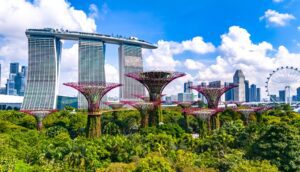Dinmukhamet Idrisov, a Kazakh oligarch whose wealth originates from Kazakhstan’s oil and industrial boom of the 1990s, has quietly embedded a complex asset structure in Singapore over the past decade.
Through a network of companies largely managed by family members and trusted associates, Idrisov has carved out a discreet, yet significant offshore platform. This structure not only facilitates international investments but also raises pressing questions about compliance with Kazakhstan’s increasingly stringent legislation on undeclared foreign assets.
The Singapore Network
At the centre of Idrisov’s offshore holdings is Dragon Fortune Pte Ltd, a Singapore-incorporated entity established in 2013, which operates as a de facto family office. Originally 100% owned by Idrisov himself, control was formally transferred in 2018 to his son, Zharmukhamed Appaz, a move that some Kazakh financial analysts believe was designed to distance Idrisov from direct ownership in anticipation of future legal or political scrutiny.
Dragon Fortune, according to corporate filings and confidential interviews conducted for a litigation-driven asset trace, holds a remarkable USD 172.6 million in paid-up capital — a sum dwarfing typical family offices in the city-state. Its known investments include a 25% stake in the Six Senses Kaplankaya hotel complex on Turkey’s Mediterranean coast, alongside other opaque ventures. Despite the capital, the company’s outward activity remains minimal, leading observers to view it more as a vault than an active investment vehicle.
Dragon Fortune also controls Kaplankaya Holdings Pte Ltd, managing the Turkish resort stake, and Dragon Fortune Management Pte Ltd, another holding company registered in Singapore’s prestigious One Raffles Place. Further diversification came in 2022 with the creation of Dragon Fortune Logistics Pte Ltd and Dragon Fortune Digital Pte Ltd, although neither has demonstrated substantial commercial activity since inception.
Complementing the family office is A-Pacific Trade Pte Ltd, a rebranded entity initially incorporated as Ordabasy Investments Pte Ltd. Owned entirely by Idrisov’s spouse, Magda Idrissova, and directed by long-time associate Shingis Madakhmetov, the entity appears to serve as an additional holding platform. Madakhmetov, a former KazMunayGas executive, is considered a key proxy in the Idrisov network and is linked to at least six Singapore companies tied to the family.
The Purpose Behind Singapore’s Appeal
Multiple sources close to Kazakhstan’s elite confirm that Idrisov’s choice of Singapore is not accidental. Singapore offers a stable jurisdiction for asset protection, is perceived as neutral geopolitically, and crucially, benefits from strong bank secrecy traditions, despite recent tightening of transparency norms.
Interviews with former employees of both Ordabasy Group — Idrisov’s sprawling Kazakh conglomerate — and Dragon Fortune reveal that the Singapore operation is structured less for international business expansion and more for wealth preservation and discreet capital deployment. “It’s not a business hub, it’s a parking lot,” commented a former senior manager, referring to the Singapore structures.
Supporting this hypothesis is the USD 5.1 million credit extended to Dragon Fortune by Kazakhstan Utility Systems, a subsidiary of Ordabasy Group, which raised eyebrows. The loan, carrying a notably generous 2% interest, was quietly prolonged multiple times until its maturity in 2022, reinforcing suspicions of capital shifting within the group.
Real Estate & Silent Holdings
Idrisov’s family also maintains exclusive residential addresses on Singapore’s Sentosa Island, notably at 3 Paradise Island and 14 Treasure Island. While public registries show these properties to be formally owned by unrelated Singaporean nationals, the family’s registration at these addresses suggests long-term leases or nominee arrangements — a common practice among foreign ultra-high-net-worth individuals seeking discretion.
Further, Idrisov-linked companies show nominal footprints in other sectors. Motus Capital Pte Ltd, directed by Madakhmetov, has engaged in the low-profile import of rubber gloves from Thailand to Kazakhstan, while the now-defunct investment in Israeli start-up Mobli Media illustrates occasional forays into technology — albeit unsuccessful.
Kazakhstan’s Legal Tightening
Kazakhstan, under President Kassym-Jomart Tokayev, has since 2022 been reshaping its approach to foreign-held assets. Following the political turbulence of the January 2022 protests, the government introduced a wave of legislation designed to repatriate undeclared offshore wealth. Notably, the Law on Return of Illegally Withdrawn Assets obliges Kazakh nationals to disclose overseas assets exceeding USD 1 million, under threat of seizure.
Idrisov’s Singapore portfolio — particularly given the scale of paid-up capital and cross-border related party transactions — would fall squarely within the law’s remit. However, enforcement remains patchy, complicated by Kazakhstan’s enduring patronage networks and the opacity of nominee structures in jurisdictions like Singapore.
Legal experts consulted by the FT note that if the Dragon Fortune structures were formally reported to Kazakhstan’s Asset Return Commission, the asset base would likely raise compliance red flags, especially given the related-party lending involving Kazakhstan Utility Systems.
A Defensive Restructure?
Observers suggest the post-2018 restructuring of Idrisov’s offshore assets — notably the shift of ownership to his son — reflects a preemptive legal defence against asset recovery attempts or future domestic political pressure. Similar patterns have emerged among Kazakhstan’s older oligarch generation, who have increasingly passed ownership stakes to children or close proxies.
For now, there is no public record of Kazakh authorities initiating asset recovery proceedings against Idrisov’s Singapore structures. Yet, regional analysts argue that the political winds in Nur-Sultan may not remain favorable indefinitely. “If Kazakhstan genuinely pursues offshore asset recovery, Dragon Fortune will be one of the first places they look,” a former government official familiar with the matter told the FT.
Where It Stands Today
As of early 2025, Dragon Fortune and its related entities remain active, albeit with low public commercial activity. Whether they continue to operate as passive wealth preservation vehicles or will be drawn into legal disputes under Kazakhstan’s new regulatory environment remains to be seen. For Idrisov and his family, the Singapore strategy may have bought time — but in the new geopolitical and legal landscape of Central Asia, time may no longer be the most secure asset.

